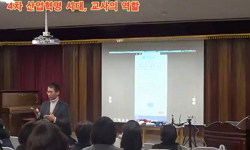목적 이 연구는 유아 주도의 본질적인 놀이와 지속가능발전교육(ESD) 사이의 관계를 조사하고, 이러한 상호작용을 위한 교사의 역할을 탐색하는 것을 목적으로 한다. 방법 문헌조사방법으...
http://chineseinput.net/에서 pinyin(병음)방식으로 중국어를 변환할 수 있습니다.
변환된 중국어를 복사하여 사용하시면 됩니다.
- 中文 을 입력하시려면 zhongwen을 입력하시고 space를누르시면됩니다.
- 北京 을 입력하시려면 beijing을 입력하시고 space를 누르시면 됩니다.

놀이와 지속가능발전교육 = A Study on Play and Education for Sustainable Development: Focusing on Competencies for Sustainable Development
한글로보기https://www.riss.kr/link?id=A108941129
- 저자
- 발행기관
- 학술지명
- 권호사항
-
발행연도
2024
-
작성언어
-
- 주제어
-
KDC
373
-
등재정보
KCI등재
-
자료형태
학술저널
-
수록면
697-710(14쪽)
- 제공처
-
0
상세조회 -
0
다운로드
부가정보
국문 초록 (Abstract)
방법 문헌조사방법으로 추진하였으며, 2023년 6월부터 11월 간 자료 수집 및 분석을 통해 유아교육에서의 지속가능발전교육에 대한 21편의 논문, 유네스코 간행물 4편, 지속가능발전교육 관련 연구 6편, 놀이 중심 교육에 대한 17편의 논문 및 관련 자료들을 검토하여 놀이와 지속가능발전교육의 관련성을 찾고자 하였다.
결과 첫째, ‘삶’이 곧 ‘앎’이 되는 과정적 목적을 지니는 발현적 교육인 유아들의 놀이 속에서 지속가능한 삶의 방식을 형성하고자 할 때, 놀이와 지속가능발전교육은 밀접한 관련성을 지닌다. 둘째, 이를 위해 교사는 놀이지원자와 안내자의 역할을 해야 한다.
결론 이 연구는 놀이를 단순한 활동이 아닌, 유아기의 고유한 특성으로서의 지속가능발전교육과의 관련성을 탐구한다. 이는 놀이가 지속가능발전교육 역량 개발에 있어 중요한 접근 방식임을 처음으로 주목하였다는 점과 놀이를 통한 지속가능발전교육이 교육적으로 의미를 갖기 위한 교사 역할을 제시하였다는 데 의미가 있다.
목적 이 연구는 유아 주도의 본질적인 놀이와 지속가능발전교육(ESD) 사이의 관계를 조사하고, 이러한 상호작용을 위한 교사의 역할을 탐색하는 것을 목적으로 한다.
방법 문헌조사방법으로 추진하였으며, 2023년 6월부터 11월 간 자료 수집 및 분석을 통해 유아교육에서의 지속가능발전교육에 대한 21편의 논문, 유네스코 간행물 4편, 지속가능발전교육 관련 연구 6편, 놀이 중심 교육에 대한 17편의 논문 및 관련 자료들을 검토하여 놀이와 지속가능발전교육의 관련성을 찾고자 하였다.
결과 첫째, ‘삶’이 곧 ‘앎’이 되는 과정적 목적을 지니는 발현적 교육인 유아들의 놀이 속에서 지속가능한 삶의 방식을 형성하고자 할 때, 놀이와 지속가능발전교육은 밀접한 관련성을 지닌다. 둘째, 이를 위해 교사는 놀이지원자와 안내자의 역할을 해야 한다.
결론 이 연구는 놀이를 단순한 활동이 아닌, 유아기의 고유한 특성으로서의 지속가능발전교육과의 관련성을 탐구한다. 이는 놀이가 지속가능발전교육 역량 개발에 있어 중요한 접근 방식임을 처음으로 주목하였다는 점과 놀이를 통한 지속가능발전교육이 교육적으로 의미를 갖기 위한 교사 역할을 제시하였다는 데 의미가 있다.
다국어 초록 (Multilingual Abstract)
Methods The study was conducted using a literature review approach. From June to November 2023, a total of 21 papers on ESD in early childhood education, 4 UNESCO publications, 6 studies on ESD, and 17 papers and re-lated materials on play-centered education were collected and analyzed to explore the connection between play and ESD.
Results First, it was found that children's play, which inherently involves the transformation of ‘living’ into ‘learn-ing’, is closely related to sustainable living practices. In this context, play and ESD are intimately connected. Second, teachers are required to act as supporters and guides in this process.
Conclusions This study explores the significance of play not just as a simple activity, but as an inherent character-istic of early childhood in relation to sustainable development education. This highlights the importance of play as a key approach in the development of ESD competencies. Furthermore, it underscores the role of teachers in giv-ing educational meaning to ESD through play.
Objectives This study aims to investigate the relationship between intrinsic play led by young children and Education for Sustainable Development (ESD), and to explore the role of teachers in facilitating this interaction. Methods The study was con...
Objectives This study aims to investigate the relationship between intrinsic play led by young children and Education for Sustainable Development (ESD), and to explore the role of teachers in facilitating this interaction.
Methods The study was conducted using a literature review approach. From June to November 2023, a total of 21 papers on ESD in early childhood education, 4 UNESCO publications, 6 studies on ESD, and 17 papers and re-lated materials on play-centered education were collected and analyzed to explore the connection between play and ESD.
Results First, it was found that children's play, which inherently involves the transformation of ‘living’ into ‘learn-ing’, is closely related to sustainable living practices. In this context, play and ESD are intimately connected. Second, teachers are required to act as supporters and guides in this process.
Conclusions This study explores the significance of play not just as a simple activity, but as an inherent character-istic of early childhood in relation to sustainable development education. This highlights the importance of play as a key approach in the development of ESD competencies. Furthermore, it underscores the role of teachers in giv-ing educational meaning to ESD through play.
목차 (Table of Contents)
- Ⅰ. 서론
- Ⅱ. 이론적 고찰
- Ⅲ. 연구결과
- Ⅳ. 결론 및 제언
- 참고문헌
- Ⅰ. 서론
- Ⅱ. 이론적 고찰
- Ⅲ. 연구결과
- Ⅳ. 결론 및 제언
- 참고문헌
동일학술지(권/호) 다른 논문
-
프랙탈 활용 교수-학습 지도가 고등학생의 수학에 대한 흥미와 가치 인식에 미치는 영향 분석
- 학습자중심교과교육학회
- 박연옥(Yeon Ok Park)
- 2024
- KCI등재
-
- 학습자중심교과교육학회
- 유명현(Myunghyun Yoo)
- 2024
- KCI등재
-
대학생의 취업 지원을 위한 대학교 취업 지원 프로그램 운영 현황과 과제
- 학습자중심교과교육학회
- 김선우(sun woo Kim)
- 2024
- KCI등재
-
- 학습자중심교과교육학회
- 이지은(jee eun Lee)
- 2024
- KCI등재




 스콜라
스콜라






